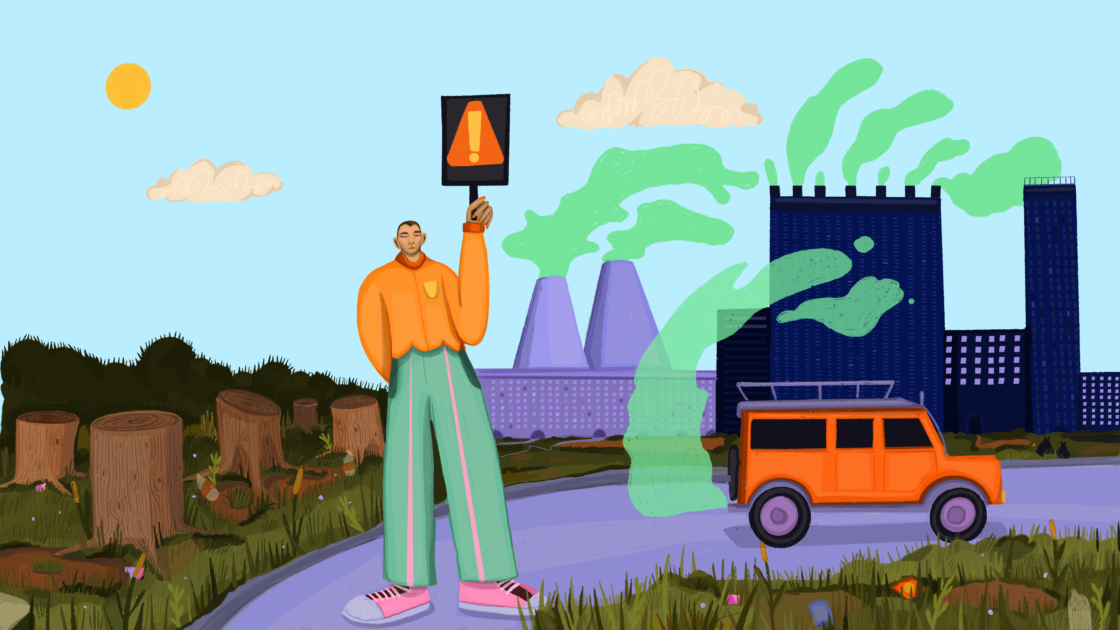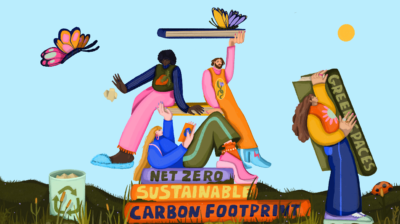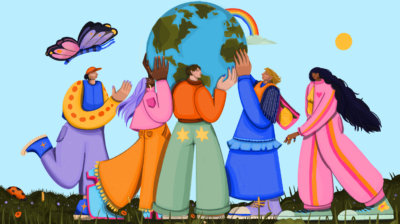5 common misunderstandings about the climate crisis
Misunderstandings about climate change are common. Learning about what people get wrong about climate change can help you raise awareness.

The climate crisis is one of the biggest issues of our time. However, there is a lot of inaccurate information that misunderstands or denies scientific facts about the reality of climate change. We might come across climate misinformation online or in conversation with others. Inaccurate information can often promote personal agendas and create confusion and doubt in other people’s minds. This can negatively affect public support for climate action. Here are five of the most common misunderstandings about climate change.
Common misunderstandings about the climate crisis
“Climate change is a natural process, not caused by humans”
It is true that the earth’s climate has always been changing. For thousands of years before human activity, global warming was caused by natural forces such as volcanic activity and changes in the earth’s orbit. This kind of climate change was very slow and occurred in regular, predictable intervals which allowed ecosystems to adapt.
What is happening with our climate today is a result of human activity. We are increasing the amount of heat-trapping greenhouse gases in the atmosphere. The climate change we are experiencing is unprecedented and occurring at a much faster pace than historical climate change. This means that nature cannot adapt quickly enough.
We can see the evidence of rapid climate change everywhere. Record-breaking summer temperatures, frequent storms, flooding and a mass extinction of species are all caused by climate change. Learn more about the effects of climate change.
“If the world is heating up, why is it still cold in Ireland?”
Global warming refers to a rise in the average temperature of the earth. According to NASA, the average global temperature on Earth has been warming by around 0.2°C per decade since the 1970s. This temperature rise is not felt equally across the world. The North and South poles are experiencing a much sharper rise in temperatures than regions closer to the equator. So while some parts of the world are experiencing record-high temperatures, other parts can still experience average or below-average temperatures.
Periods of cold weather are commonly used to ‘disprove’ climate change. However, it is important to understand the difference between weather and climate. The weather can change from day to day, whereas the climate changes slowly, over longer periods of time. Changes in the climate can be harder to notice in Ireland than changes in the weather, but they are happening.
According to the Environmental Protection Agency (EPA), Ireland has experienced an unprecedented temperature increase of approximately 0.8°C since 1900. Increases in rain and sea level have also been recorded, and the length of the frost season has shortened. These changes have led to increased flooding and impacts on the agriculture industry. Learn more about how climate change is affecting Ireland.
“Not all scientists agree that Climate Change is real”
While this statement is not untrue, it is very rare for a scientific issue to be backed by 100% of scientists. However, the consensus is still high: around 97% of scientists agree that human activity is impacting the earth’s climate. This is based on well-established evidence that has been collected over decades. There are a small number of scientists who reject this consensus. However, research has found that scientists with a higher level of climate expertise are more likely to agree that human activities are impacting the climate.
“Population growth is to blame for Climate Change”
Some argue that to stop the climate crisis, population growth needs to be controlled. Population growth is the increase in the number of people in an area or country. This argument doesn’t take into account the fact that some countries are far more responsible for climate change than others. Historically, the vast majority of global greenhouse gas emissions came from the United States and Europe, where population growth is slower than the rest of the world. Research has also shown that high-income countries, which account for only 16% of the world’s population, are responsible for the majority of excess resource use.
While controlling population growth will help reduce emissions, it will not solve the climate crisis. Putting all of the blame on countries with high population growth ignores the fact that wealthy countries with smaller populations have historically produced far more greenhouse gas emissions. As a wealthy country and one of the highest emitters in Europe, Ireland has a responsibility to end reliance on fossil fuels and change how and what is consumed.
“Climate change is a future problem”
Climate scientists often use predictive models and timelines to show how serious the future consequences of climate change will be. This is data that shows future consequences based on current patterns. However, climate change itself is not a future problem. We can see the effects of climate breakdown all around us.
Adverse weather events are becoming a regular occurrence. They lead to devastating wildfires and floods threatening the lives of millions of people around the world. Global food supplies are also impacted by the changing climate, creating instability and conflict. Ocean acidification, caused by the absorption of greenhouse gases such as carbon dioxide, is putting marine life under pressure.
These issues will only worsen over time if we do not take action now. We are in a unique position as the last generation with the chance to create significant change for our planet and protect future generations. Learn more about how to take action for the climate.
How to spot misinformation about climate change online
Here are some questions to ask yourself when trying to figure out if climate information is reliable:
- Do you recognise the website as a trusted news/information source?
- Is the author a qualified climate expert and do they reference the work of legitimate scientists or institutions?
- Is the article written in a professional, unbiased manner?
- Is the author trying to stir strong emotions, like anger or fear, or promote mistrust in scientifically credible organisations (such as the Environmental Protection Agency (EPA) or the Intergovernmental Panel on Climate Change (IPCC))?
- Does the author or website have a particular financial interest in denying climate change?
- Is climate-friendly language or greenwashing being used to distract from the polluting behaviours of a company (for example “clean coal”)?
If you come across climate misinformation on social media, the best course of action is to report it. Learn more about identifying misinformation online.
Feeling overwhelmed and want to talk to someone?
- Get anonymous support 24/7 with our text message support service
- Connect with a trained volunteer who will listen to you, and help you to move forward feeling better
- Whatsapp us now or free-text SPUNOUT to 50808 to begin.
- Find out more about our text message support service
If you are a customer of the 48 or An Post network or cannot get through using the ‘50808’ short code please text HELLO to 086 1800 280 (standard message rates may apply). Some smaller networks do not support short codes like ‘50808’.






